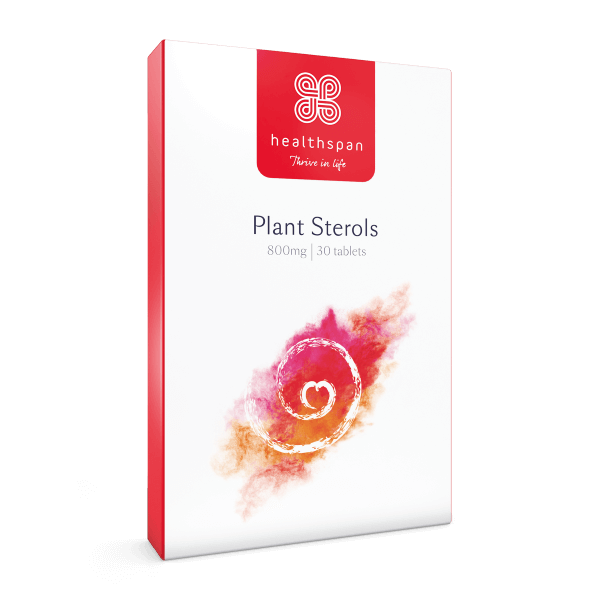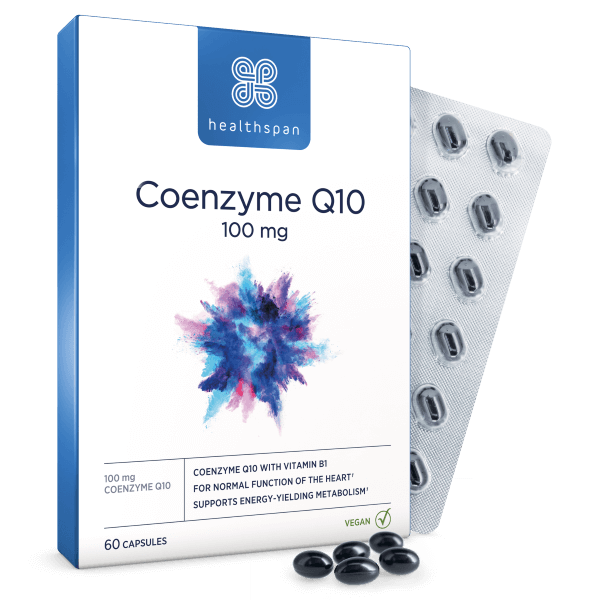Both statins and plant sterols can help to lower cholesterol and protect your heart. But how do they work, can you take them together and are there side effects? Jane Collins investigates.
🕒 7 min read
According to the Health Service Executive, "Coronary heart disease (CHD) is a major cause of death in Ireland and worldwide." The Irish Heart Foundation says that 9,000 people each year die from cardiovascular disease, including CHD, stroke and other circulatory diseases.
The statistics are shocking, but that doesn't mean there isn't effective medication, natural remedies and lifestyle changes that can help, including cholesterol-lowering statins and plant sterols supplements. Discover how these two preventative tablets work to treat and help prevent the cholesterol that can lead to potentially life-threating heart problems.
What exactly is cholesterol?
Cholesterol is a waxy, fatty substance made in the liver and found in your blood and all the cells in your body. Cholesterol is not inherently bad and is indeed necessary and important: for healthy cells, supporting digestion, and creating many hormones and vitamin D.
There are, however, two main types of cholesterol.
LDL (low density lipoprotein)
This is sometimes known as 'bad' cholesterol because it transports cholesterol to your arteries, where it can build up in the artery walls.
Too much of this cholesterol in your arteries can lead to a build-up of plaque and a condition known as atherosclerosis. This can increase the risk of blood clots that break away and block an artery in your heart or brain, potentially leading to a heart attack or stroke. All attempts to improve heart health concentrate on reducing this kind of cholesterol.
HDL (high density lipoprotein)
This is known as 'good' cholesterol because it ferries cholesterol to your liver, where it is released from your body. In other words, it helps your body to mop up and get rid of excess cholesterol. Study after study has shown those with higher HDL levels have lower rates of heart disease.
How to measure cholesterol
The only way to know if your cholesterol is high is to have it measured via a blood test (this can be done by your GP or pharmacist).
High cholesterol can be inherited, but is very often the result of an unhealthy lifestyle – eating too much fatty food, not exercising regularly, being overweight and smoking and/or drinking – making it both treatable and preventable if you change a few habits.
It should also be pointed out that along with increasing your risk of heart disease, research published in medical journal The Lancet has shown that having high levels of cholesterol in mid-life (taken to mean under 65) can be a moderate risk factor for developing dementia later on.
What are statins and how do they help cholesterol?
Statins are cholesterol-busting drugs that first became available in the 1980s.
Statins work by blocking a substance produced in the liver called HMG-COA reductase, which is required for cholesterol production. Around seven to eight billion people take them in a bid to lower their cholesterol and their risk of heart attack and stroke.
A 2019 study published in medical journal The Lancet suggests that statins could benefit people of all ages who are at risk of cardiovascular disease. Research from 2021 also links statin use with a reduced risk of death in the over-65s.
As with all medications statins can have potential side effects – the most widely documented ones include:
- Muscle aches and pain: reported to be the most common side effect (and affecting more women than men)
- Sleep problems including insomnia, hallucinations and nightmares
- Fatigue
The largest study looking into the side effects of statins, published in 2022 in the European Heart Journal, suggests that reported side effects may be 'over-estimated and over-diagnosed' and that the drugs are well tolerated by the majority (the study suggests that between six to 10 per cent could be intolerant to statins).
Although taking statins is generally largely uncontroversial for those with established cardiovascular disease, concerns have been raised about them being prescribed as preventatives when lifestyle changes (eating healthier, exercising more, not smoking and/or drinking more than the recommended amounts) and taking supplements, like plant sterols, may be more appropriate. Not everyone wants to take them, either.
What are plant sterols and how do they work?
Plant sterols are naturally occurring substances found in plants that can help to lower your cholesterol by decreasing the absorption of cholesterol in the intestines. Plant stanols are often mentioned alongside plant sterols; they have a similar molecular structure and also help to reduce cholesterol absorption.
Where do you find plant sterols?
You can find plant sterols in small quantities in fruits, vegetables, wholegrains like wheat germ, pulses, and nuts and seeds. They can also be found in foods fortified with plant sterols, such as certain margarines. One study involving people with high cholesterol who switched from normal margarine to margarine containing plant sterols found that they reduced their cholesterol levels by 14 per cent within a year.
Cholesterol-lowering effects can vary widely according to the individual, but there's evidence that eating foods fortified with plant sterols can reduce LDL 'bad' cholesterol by between 10-15 per cent when consumed regularly as part of a healthy diet.
Plant sterols, either in the form of fortified foods or as supplements, are most effective when taken with food, and it's also worth noting that in studies eating plant sterol-fortified foods with your main meal was found to be the most effective way of controlling cholesterol. Another study suggests that they are best taken 'little and often' (up to three times a day rather than in one large dose) for maximum benefits.
Another simple and straightforward way to take plant sterols is in supplement form, and a 2013 review and meta-analysis of eight studies found that plant sterols supplements were equally as effective at reducing levels of LDL 'bad' cholesterol as foods fortified with them.

Plant Sterols 800mg
Proven to maintain or lower cholesterol
- Blocks the absorption of dietary cholesterol
- One tablet a day maintains normal cholesterol levels
- Three tablets a day (2.4g) lowers cholesterol levels
Plant sterols side effects
There are also very few reported side effects associated with taking plant sterols supplements – although some people might experience mild diarrhoea or notice fat in their stools.
What dosage should you aim for?
For best results intakes of at least 2g to 2.4g per day are needed.
Is it safe to take statins and plant sterols?
Because plant sterols work in a different way to statins, the two can be combined to lower cholesterol through a two-pronged approach. In fact, adding sterols to statin medication is more effective than doubling the statin dose.
What other supplements can be partnered with plant sterols?
CoQ10 is a vitamin-like substance that helps convert food into energy and is a potent antioxidant. Research links low levels of CoQ10 with low levels of heart-protective HDL cholesterol.
CoQ10 is found naturally in foods like offal, sardines, peanuts, sesame seeds and broccoli. It is produced naturally in the body and is known to help with circulatory health, but CoQ10 levels diminish naturally with age.
A 2014 study also shows that 75% of statin users who complained of mild-to-moderate muscle pain reported the muscle pain subsided after taking 50mg of CoQ10 twice daily for 30 days. The more absorbable form of CoQ10 is ubiquinol.
Tip: CoQ10 is a fat-soluble vitamin and is better absorbed when taken with food.
Studies show that supplementing with garlic can have a significant impact on reducing high blood pressure, another risk factor in cardiovascular disease.

Coenzyme Q10 100mg
100mg CoQ10 for normal function of the heart
- Supports heart health and energy-yielding metabolism
- Sunflower oil base aids quicker absorption
- Fermented for optimum purity






